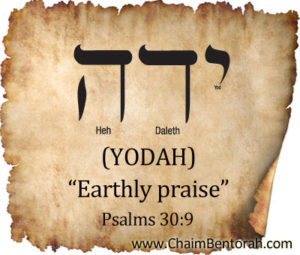HEBREW WORD STUDY – EARTHLY PRAISE – YODAH ידה
Psalms 30:9 “What profit is there in my blood, if I go down to the pit. Will the dust praise thee, will it declare your faithfulness?”
 It is believed that David wrote this Psalm during a time of illness when he thought he was going to die and he was pleading with God to extend his life. This verse gives David’s reason for wanting his life extended.
It is believed that David wrote this Psalm during a time of illness when he thought he was going to die and he was pleading with God to extend his life. This verse gives David’s reason for wanting his life extended.
Note the word for profit is basi which is used for unjust profit. David, like Paul, could say: “For me to live is Christ to die is gain. ( Philippians 1:21)” Yet, for David, to die prematurely would be an unjust gain. We can grow weary of the stresses of this life. How can we not get homesick for heaven? Well, we have something that those who have gone on before us no longer have. David recognizes it in this Psalm.
It is found in this phrase: “Will the dust praise thee?” The word dust in Hebrew is ’aphar which means dust or dry earth. But in its Semitic origin, it has the idea of being devoid of spiritual discernment, speech, and divine power. David is contrasting the state of death with life. In death there will be no need for spiritual discernment for you will be in the presence of God and you will not have to seek spiritual insight to decide if what you are about to do is God’s will or not. In death, you will no longer have a physical speech where you struggle to express your heart to God. Your heart will be your speech. Then too in death, you will no longer need the Divine power of God to deliver you from difficult situations as you will no longer have difficult situations.
So what did David mean that the dust, or in the state of death, we will not be able to praise Him? Will we not praise Him for all eternity? True, but we will not be able to exercise one type of praise. This is the praise David is referring to, he uses the Hebrew word yadah. There are many types of praises, but this one is special, it is a praise we can only offer here on earth, in the flesh. It is a voluntary praise. It is a praise that the angels can never offer to God. It is a praise in the midst of trials and persecutions. Although we will never have the opportunity to offer this praise in eternity, we will spend eternity giving testimony to the angels and other created beings of our time on earth when we could offer that praise. We will spend eternity traveling the universe to visit other created beings to share our stories with them. Can you imagine spending eternity traveling the universe with a team of saints, to share to an eager audience of created beings the time you lost your job and God met your need or the time you faced a broken heart and God healed it? Together with these created beings, you will again rejoice over the faithfulness and love of God. You will spend eternity reliving the joy of that moment when God delivered you.
This is why James said in 1:2 “Consider it all joy when you encounter various trials.” What so joyful about trials? Because we are being given something of eternal value. We are building a backlog of testimonies.
So many Christians sit in church every Sunday longing to get up and just give a few minutes of testimony. But, unfortunately, testimony time has gone the way of the choirs and hymns. But, take heart, for one day you will be giving your testimony to your heart’s desire, for all of eternity. So take advantage of every problem, heartache, and pain and find God’s deliverance. For one day you may just join David on a praise and worship team giving all those testimonies.







The reading of your insight to the meaning of words in scripture causes a paradigm shift that creates a longing to KNOW God and His heart and to love Him more! Thank you for your heart for God and the effort to share daily.
Thank you so much for sharing your personal testimony with us, I don’t remember how I found your ministry but I thank the Lord I did, I have learned so much!!!
Thank you & Shalom
All I can say is Amen and Praise The Lord 😀😘
How very encouraging, thank you